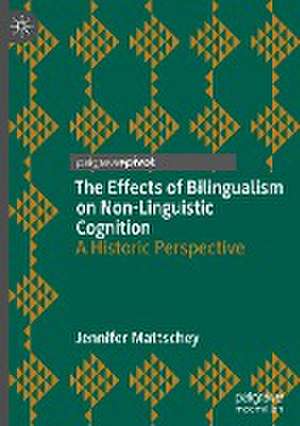The Effects of Bilingualism on Non-Linguistic Cognition: A Historic Perspective
Autor Jennifer Mattscheyen Limba Engleză Hardback – 29 iun 2023
This book examines a century of research on the relationship between bilingualism and intelligence and relates it to more recent research on bilingualism and executive functioning. In doing so, it highlights how bilingualism research has been understood and used by wider society and its impact on current debates in cognitive science as well as language policy and education.
The book probes the correlation between the fact that while early intelligence research suggested a negative effect of bilingualism on intelligence, the so-called “Bilingual Problem”, later research implied a positive effect, “the Bilingual Advantage.” It questions whether the negative consequences that arose from the Bilingual Problem are influencing researchers’ reluctance to let go of the Bilingual Advantage. Findings on both the bilingual ‘advantage’ and ‘disadvantage’ are shown to have suffered from similar methodological problems, with research into the former finding itself at the centreof the ongoing replication crisis in psychology.
This book provides fresh insights that will be of particular interest to students and scholars of cognitive psychology, psycholinguistics, bilingualism, applied linguistics, education and the history of science.
The book probes the correlation between the fact that while early intelligence research suggested a negative effect of bilingualism on intelligence, the so-called “Bilingual Problem”, later research implied a positive effect, “the Bilingual Advantage.” It questions whether the negative consequences that arose from the Bilingual Problem are influencing researchers’ reluctance to let go of the Bilingual Advantage. Findings on both the bilingual ‘advantage’ and ‘disadvantage’ are shown to have suffered from similar methodological problems, with research into the former finding itself at the centreof the ongoing replication crisis in psychology.
This book provides fresh insights that will be of particular interest to students and scholars of cognitive psychology, psycholinguistics, bilingualism, applied linguistics, education and the history of science.
Preț: 319.13 lei
Nou
Puncte Express: 479
Preț estimativ în valută:
61.07€ • 66.54$ • 51.46£
61.07€ • 66.54$ • 51.46£
Carte disponibilă
Livrare economică 02-16 aprilie
Livrare express 18-22 martie pentru 29.38 lei
Preluare comenzi: 021 569.72.76
Specificații
ISBN-13: 9783031346804
ISBN-10: 3031346807
Pagini: 130
Ilustrații: X, 130 p.
Dimensiuni: 148 x 210 x 15 mm
Greutate: 0.32 kg
Ediția:1st ed. 2023
Editura: Springer International Publishing
Colecția Palgrave Macmillan
Locul publicării:Cham, Switzerland
ISBN-10: 3031346807
Pagini: 130
Ilustrații: X, 130 p.
Dimensiuni: 148 x 210 x 15 mm
Greutate: 0.32 kg
Ediția:1st ed. 2023
Editura: Springer International Publishing
Colecția Palgrave Macmillan
Locul publicării:Cham, Switzerland
Cuprins
1.Introduction.- 2.Bilingual Education in the Early Twentieth Century.- 3.The Bilingual Problem.- 4. Mid-Twentieth Century: Bilingualism and Intelligence.- 5.Late Twentieth Century: Meta-Linguistics.- 6.The Bilingual Advantage.- 7. Is Bilingualism Good or Bad?.
Notă biografică
Jennifer Mattschey is Staff Tutor in Psychology and Counselling and Associate Lecturer in Mental Health Sciences at the Open University, UK. Dr Mattschey is a cognitive psychologist whose research experience includes projects in psycholinguistics, social cognition, perception and attention, as well as brain imaging.
Textul de pe ultima copertă
This book examines a century of research on the relationship between bilingualism and intelligence and relates it to more recent research on bilingualism and executive functioning. In doing so, it highlights how bilingualism research has been understood and used by wider society and its impact on current debates in cognitive science as well as language policy and education.
The book probes the correlation between the fact that while early intelligence research suggested a negative effect of bilingualism on intelligence, the so-called “Bilingual Problem”, later research implied a positive effect, “the Bilingual Advantage.” It questions whether the negative consequences that arose from the Bilingual Problem are influencing researchers’ reluctance to let go of the Bilingual Advantage. Findings on both the bilingual ‘advantage’ and ‘disadvantage’ are shown to have suffered from similar methodological problems, with research into the former finding itself at the centre of the ongoing replication crisis in psychology.
This book provides fresh insights that will be of particular interest to students and scholars of cognitive psychology, psycholinguistics, bilingualism, applied linguistics, education and the history of science.
The book probes the correlation between the fact that while early intelligence research suggested a negative effect of bilingualism on intelligence, the so-called “Bilingual Problem”, later research implied a positive effect, “the Bilingual Advantage.” It questions whether the negative consequences that arose from the Bilingual Problem are influencing researchers’ reluctance to let go of the Bilingual Advantage. Findings on both the bilingual ‘advantage’ and ‘disadvantage’ are shown to have suffered from similar methodological problems, with research into the former finding itself at the centre of the ongoing replication crisis in psychology.
This book provides fresh insights that will be of particular interest to students and scholars of cognitive psychology, psycholinguistics, bilingualism, applied linguistics, education and the history of science.
Caracteristici
Examines a century of research on the effects of bilingualism on cognition Highlights parallels between recent and historic research into both the bilingual ‘advantage’ and ‘disadvantage’ Explores how bilingualism research has been understood and used by wider society
